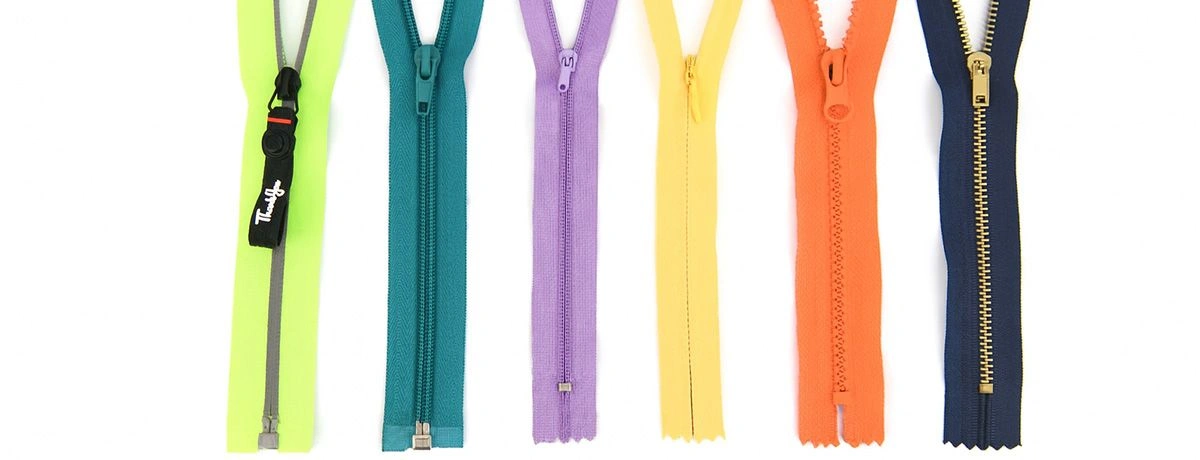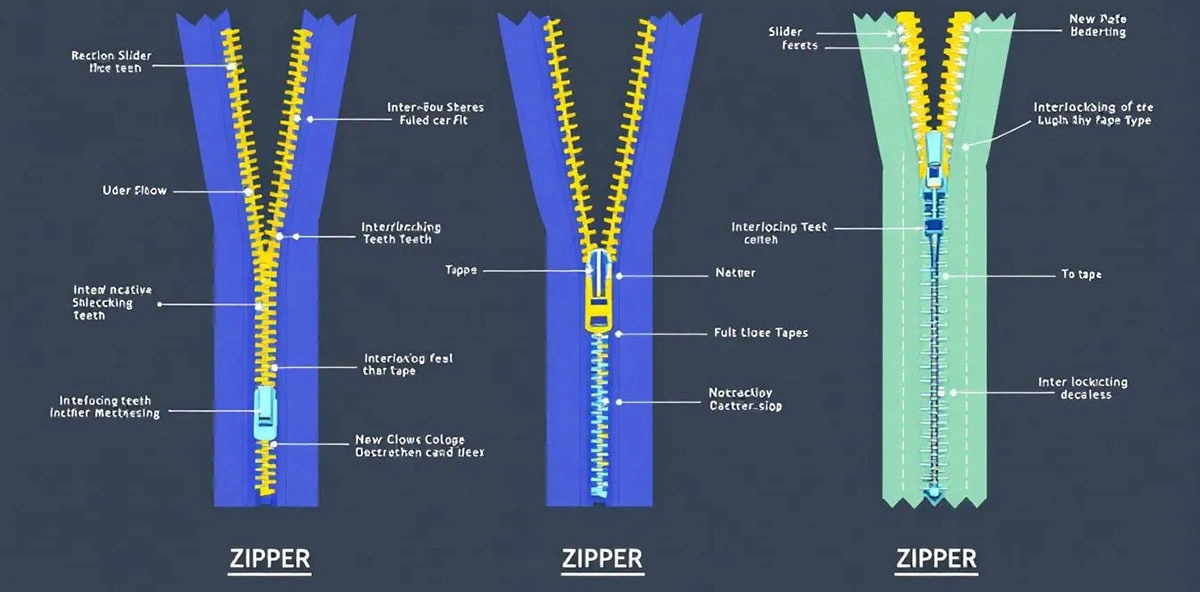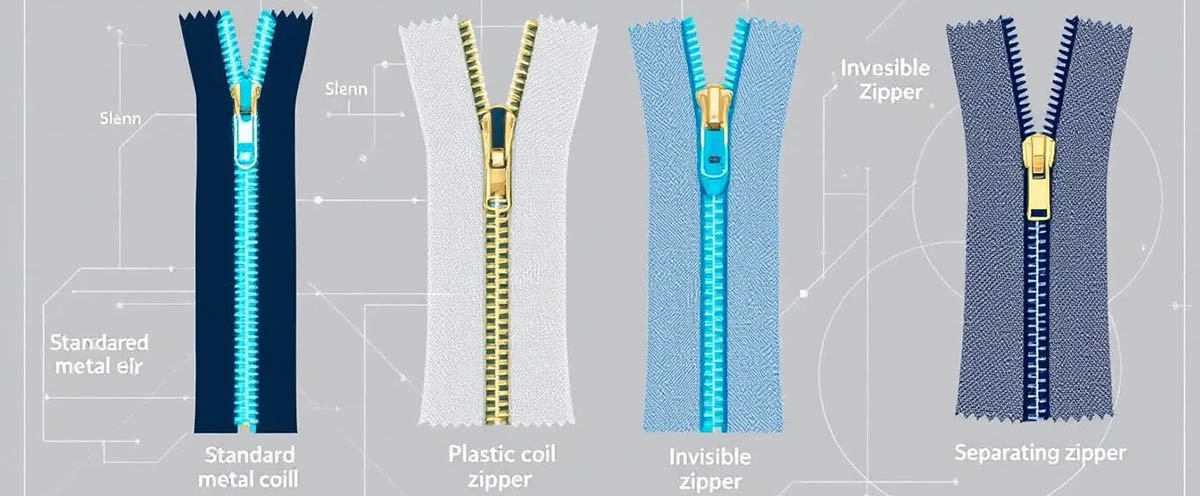Mastering Zipper Type: A Comprehensive Guide

Need to choose the right zipper type for your project? This guide covers the main types of zippers—metal, molded plastic, and coil—and their specific uses. By the end, you’ll know which zipper suits your needs best.
Key Takeaways
-
Understanding zipper anatomy, including key components like the slider and zipper tape, is crucial for selecting the right type for your project.
-
The main types of zippers—metal, molded plastic, and coil—each have unique advantages, making them suitable for different applications from fashion to outdoor gear.
-
Custom zipper solutions from providers like MH offer personalized options for length, color, and design, ensuring zippers meet specific project requirements.
Understanding Zipper Anatomy

Understanding the anatomy of a zipper is essential before exploring the different types. A zipper is made up of several key components that collectively ensure a secure and functional closure. The zipper tape is the fabric that holds the teeth in place and serves as the foundation. Without this sturdy base, the teeth wouldn’t align properly, compromising functionality.
Another vital part is the zipper slider, which:
-
Interlocks and separates the teeth as it moves up and down the tape.
-
Ensures smooth operation for the zipper to function effortlessly.
-
Acts as the engine that drives the entire zipper mechanism.
Other critical elements include the top stops, which prevent the slider from detaching, and the starter box and insertion pin, which help in aligning separating zippers correctly during closure. Knowing these components, including the bottom stop and the box and pin mechanism, provides a solid foundation for exploring the various types of zippers and their unique characteristics, including the pin mechanism.
Main Types of Zippers

Zippers come in a variety of types, each tailored for specific applications and materials. There are three main types of zippers you will encounter, including zipper types such as metal zippers, molded plastic zippers, and coil zippers. Each type offers unique benefits and is suited to specific uses, so understanding their characteristics and applications is important.
Constructed from stamped metal strips like brass, aluminum, or nickel, metal zippers are known for their strength and durability. They are commonly used in heavy-duty applications such as jeans, workwear, and leather projects.
Conversely, molded plastic zippers are made from polyacetal resin and are highly resistant to corrosion and UV damage, making them ideal for outdoor use.
Coil zippers use a continuous zipper chain of nylon coil or polyester, offering flexibility and lightweight construction, making them perfect for fashion garments and outdoor gear. These zippers are often produced in vibrant colors and various sizes to suit a wide range of applications.
Knowing these main types will help you choose the right zipper for your project, ensuring both functionality and aesthetic appeal. Understanding zipper types will enhance your selection process.
Metal Zippers
Metal zippers are the workhorses of the zipper world, recognized for their strength and durability. Key characteristics include:
-
Teeth made from materials like brass, aluminum, or nickel
-
Designed to withstand heavy use and provide a secure closure
-
Constructed by stamping metal strips to form individual metal teeth
-
Teeth are then mounted onto the metal zipper tape
A standout feature of metal zippers is their variety of finishes. Whether you prefer the vintage look of antique brass or the sleek appearance of shiny nickel, there’s a finish to suit every style. These finishes enhance the zipper’s appearance and provide added corrosion resistance, ensuring longevity.
Due to their robustness, metal zippers are commonly used in heavy-duty coats, duffle bags, and leather projects. However, they can be heavier and more rigid compared to other types, which may not be ideal for all applications. Despite this, their reliability and strength make them a popular choice for garments and accessories requiring durability.
Molded Plastic Zippers
Molded plastic zippers are versatile and cost-effective, made by injecting plastic into molds to form uniform zipper teeth molded. Known for their strength and durability, they are suitable for a wide range of applications. Each tooth is separately fused onto the tape, allowing for easy alterations and a secure fit.
A key advantage of molded plastic zippers is their resistance to rust and corrosion, even when exposed to water. This makes them ideal for outdoor gear and applications where the zipper might come into contact with moisture. Additionally, these zippers come in a variety of vibrant colors, adding a fun and functional element to children’s clothing and bags.
Molded plastic zippers balance strength and flexible operation, maintaining smooth operation even under harsh conditions like saltwater exposure. Their durability and resistance to environmental factors make them a reliable choice for many projects, from clothing to outdoor equipment.
Coil Zippers
Coil zippers are popular in the fashion and outdoor industries due to their flexibility and lightweight construction. Often made from nylon or polyester, the latter is becoming more common due to its enhanced durability. The defining characteristic of a coiled coil zipper is its continuous spiral pattern, allowing for smooth operation in both directions.
The flexibility of coil zippers makes them ideal for various applications, including clothing, backpacks, and camping gear. Their lightweight nature means they add minimal bulk to the finished product, making them perfect for lightweight apparel. Despite their delicate appearance, coil zippers are designed to withstand significant wear and tear, providing reliable closure for a range of items.
Coil zippers come in a plethora of colors and sizes, allowing for creative and functional integration into fashion garments. Whether designing a sleek dress or a rugged backpack, coil zippers offer the versatility and strength needed to complete your project.
Specialty Zippers
Specialty zippers cater to unique needs and applications, offering features beyond standard zipper functions. For example, invisible zippers:
-
Have teeth that are concealed when zipped, creating a seamless appearance
-
Are commonly used in dresses and skirts
-
Are ideal for formal wear, providing an elegant and unobtrusive closure
Waterproof zippers are another specialty type, designed with waterproof tape to shield the teeth from moisture. These zippers are ideal for outdoor gear like tents and scuba equipment, ensuring the contents stay dry even in wet conditions.
Two-way zippers, featuring two sliders and a slider body, allow for independent movement and are often used in jackets, sleeping bags, and luggage for added flexibility, including closed end zippers, ykk zippers, vislon zippers, end zippers, and a jacket zipper. The design of these zippers enables you to pull them easily, including zipper sliders, closures, and zip.
Specialty zippers like fire-resistant zippers are engineered to withstand high temperatures and flames, making them suitable for protective clothing and equipment. These unique features make specialty zippers essential in various industries, providing tailored solutions for specific needs.
Zipper Sizing and Measurement
Choosing the right zipper size is essential for ensuring the functionality and aesthetic of your project. Zipper sizes are determined by measuring the width of the closed teeth in millimeters. This measurement helps identify the appropriate zipper for different sizes of applications, with lower numbers indicating lighter zippers and higher numbers for heavier ones.
Zippers can be categorized by weight and suitable applications:
-
Lightweight zippers (#2 and #3): Ideal for smaller projects like delicate garments and accessories.
-
Medium-weight zippers (#4.5 and #5): Commonly used in pants, jeans, and everyday wear, providing a balance of strength and flexibility.
-
Heavy-duty zippers (#7 to #10): Suitable for larger projects, outdoor gear, and heavy garments.
Accurate zipper sizing ensures the zipper aligns with the weight of the fabric and the nature of the project, preventing issues like zipper failure or fabric distortion. Understanding how to measure and choose the right zipper size is crucial for achieving a professional finish in your sewing projects.
Custom Zipper Solutions by MH
MH is a trusted name in garment accessories, offering a wide range of custom zipper solutions to meet diverse needs. With over 20 years of experience, MH specializes in tailoring zippers to various specifications, including custom lengths, colors, and slider designs. This flexibility allows you to create zippers that perfectly match your project’s requirements.
MH provides custom zipper solutions for garments, bags, tents, shoes, outdoor gear, and home textiles, ensuring smooth operation, high durability, and consistent quality. Focusing on wholesale, MH serves garment factories, fashion brands, and wholesalers in over 150 countries, providing bulk supply at factory-direct prices. Their extensive range of customization options ensures you can find the perfect zipper for any application.
Whether you need a specific color to match your brand or a unique slider design for a special project, MH’s OEM/ODM services cater to your needs. Their commitment to quality and fast delivery makes them a reliable partner for all your zipper needs.
Summary
Throughout this comprehensive guide, we’ve explored the fascinating world of zippers, delving into their anatomy, the main types, and their unique applications. Understanding the different components and types of zippers enables you to make informed decisions for your projects, ensuring both functionality and aesthetic appeal.
From the robust metal zippers used in heavy-duty applications to the flexible and lightweight coil zippers perfect for fashion and outdoor gear, each type offers distinct advantages. Specialty zippers provide tailored solutions for specific needs, enhancing the versatility of these essential fasteners.
As you embark on your next project, remember the importance of choosing the right zipper size and considering custom solutions from MH. Their expertise and commitment to quality ensure that you have access to the best zippers for any application. Happy sewing!
Frequently Asked Questions
What are the main types of zippers?
The main types of zippers you’ll encounter are metal zippers, molded plastic zippers, and coil zippers, and each type is designed for different uses and materials. So, choosing the right one makes all the difference!
How do I measure zipper size?
To measure zipper size, simply check the width of the closed teeth in millimeters. This measurement will ensure you choose the right zipper for your project.
What are invisible zippers used for?
Invisible zippers are perfect for adding a sleek finish to formal wear and dresses, as they create a hidden closure that enhances the garment's overall elegance. You’ll love how they keep things looking polished and seamless!
Why choose molded plastic zippers for outdoor gear?
Molded plastic zippers are a fantastic choice for outdoor gear because they're rust and corrosion-resistant, which means they can handle moisture and tough conditions with ease. You'll appreciate their durability when you're out in the elements!
What custom solutions does MH offer?
MH provides OEM/ODM customizations for zipper length, color, and slider design, catering to various products like garments, bags, and outdoor gear. This means you can get exactly what you need for your specific project!


